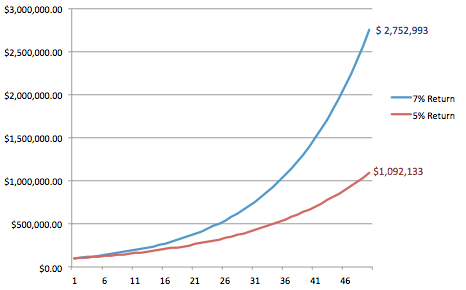Market Commentary
Stocks wrapped up a stellar first quarter with the S&P 500 finishing at an all-time high, besting its last high in October 2007. For the quarter, large-cap stocks (represented by the S&P 500) were up 10.6%. Small-cap stocks also did quite well, returning 12.4% in the first quarter. International markets had a positive return of 5.3% January through March, while emerging market stocks lost some ground, with a negative return of -1.5%. Domestic real estate did well, gaining 7% as measured by the Dow Jones US Select REIT Index.
Positive economic news likely fueled the excellent quarter for all stocks. The final government report for fourth-quarter GDP showed an annual increase of 0.4%, slightly higher than the expected increase of 0.3%. The housing market has continued its slow comeback from the Great Recession, though the housing market in general has benefited from record low interest rates and improving employment conditions. The supply of new homes remains near record lows while median home prices rose 2.9% year over year to $246,800. The decline in consumer confidence in March and the increase in jobless claims over expectations did not seem to have a negative impact on the strong stock rally this quarter.
It is not likely that the stocks will continue to rise at this torrid pace. History says double-digit stock market gains in the first quarter all but assure a gain for the full year, however the average gain is 1.4% for the remainder of the year.
Challenges ahead for the bond market
Bond returns were near zero for the quarter with the benchmark Barclays US Government/Credit Bond Index down (0.16%). The Federal Reserve is acting aggressively to keep short-term interest rates down while also buying treasury bonds that depresses long-term bond yields. The Fed does not look to change course anytime soon. When the Fed does decide to raise interest rates, it plans to do so slowly.
The bond market had a great 10-year run that mathematically is virtually impossible to duplicate due to the very low yield environment. However, it is critical to remember the importance of bonds in a globally diversified portfolio. The ability of high quality and less risky bonds to smooth out the volatility of an overall portfolio that contains domestic and international stocks is critical to long-term investor success.
Investing is uncertain
Building investment portfolios is what we do. We build them for real people who want to maintain their standard of living in retirement. We integrate the best scientific evidence with the art of portfolio construction in an effort to give our clients the best possible chance of being successful investors. However, markets are uncertain and risky by nature so we also spend time making sure our clients do not make emotional decisions based on short-term events or news. Doom and gloom sells newspapers and books so we often get questions about the impact of recent events on our clients’ portfolios.
I will contrast two very different opinions that I’ve read recently. First, David Stockman wrote an opinion piece in the New York Times promoting his book “The Great Deformation: The Corruption of Capitalism in America”. The New York Times article was so popular it went viral on the web. The crux of the article and the book is this: the country’s economic condition is worse than everyone thinks and on the brink of collapse in the near term future. Stockman is a former congressman and director of the Office of Management and Budget under President Ronald Reagan. He is clearly a smart and experienced man who has proffered his thoughtful analysis. Stockman’s prescription for investors is to flee the stock market and keep all your money in cash. Contrast that opinion with Warren Buffet, arguably the most successful investor in history, who shared his thoughts in his much anticipated annual letter to shareholders of Berkshire Hathaway. Quote from the shareholder letter:
American business will do fine over time. And stocks will do well just as certainly, since their fate is tied to business performance. Periodic setbacks will occur, yes, but investors and managers are in a game that is heavily stacked in their favor. (The Dow Jones Industrials advanced from 66 to 11,497 in the 20th Century, a staggering 17,320% increase that materialized despite four costly wars, a Great Depression and many recessions. And don’t forget that shareholders received substantial dividends throughout the century as well.)
Since the basic game is so favorable, Charlie and I believe it’s a terrible mistake to try to dance in and out of it based upon the turn of tarot cards, the predictions of “experts,” or the ebb and flow of business activity. The risks of being out of the game are huge compared to the risks of being in it.
End quote. The contrast can be boiled down to “pessimism” vs. “optimism”. While Stockman may be correct in articulating the very big problems facing America, I do not believe that we are facing the downfall of capitalism in general. I prefer the optimistic view of the future described by Warren Buffet and I expect the markets to survive and reward those willing to endure the risks of investing.



